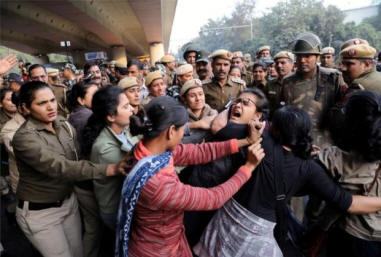|
Pakistan's premier website that covers current affairs and news. |
|||
|
Economist magazine subscription
|
|
Does JNU campus attack mean India is failing its young? Its list of alumni includes a Nobel-Prize winning economist, former prime ministers of Libya and Nepal, and many leading politicians, diplomats, artists and academics. It is also an internationally renowned centre for teaching and research, and is among one of India's top ranked universities. |
|
|
Yet the storied reputation of Delhi's Jawaharlal Nehru University (JNU) didn't deter a mob of masked men armed with sticks, stones and iron rods running berserk on its sprawling campus on Sunday evening. They attacked students and teachers and destroyed property even as the police refused to intervene for more than an hour. Outside the campus gates, another mob shouted nationalist slogans and targeted journalists and ambulances. Nearly 40 people were hurt in the violence. |
|
||
|
Left and right-wing students groups have blamed each other for the violence. Most eyewitnesses told reporters that the mob was mainly made up of men belonging to the ABVP - the right-wing students group linked to India's governing Bharatiya Janata Party (BJP) - and a clutch of outsiders. Ostensibly, Sunday's violence appears to have been stoked by a dispute over a hostel fee hike, which has roiled the campus for the last few months. University authorities have blamed the attack on a "group of students" who were opposing an ongoing admission process to register new students - it is widely believed that the statement referred to leftist students who have been protesting against the fee hike. But there are deepening fears that the BJP wants to muzzle dissent on the campus, which has traditionally been a hotbed of left-wing politics. Ever since Mr Modi's party stormed to power riding a crest of Hindu nationalism, JNU has been a constant target. Students have been charged with sedition for making speeches, and the university has been vilified by the party and partisan news networks as "anti-national". Its students have been called "urban" Maoists. Sunday's campus attack tells you a few things about India. For one, it points to a breakdown of law and order in the capital, the responsibility of which lies with India's powerful interior minister Amit Shah. If mobs can enter one of India's best universities and the police fails to protect students and teachers, then who exactly is safe, many are asking. Also, critics say BJP's brand of politics is leading to expected - and disturbing - consequences. Since he has been in office, Mr Modi and Mr Shah have relentlessly belittled and demonised political opponents and critics, calling them anti-national and and urban Maoists. "By calling all protests as anti-national, an atmosphere of legtimisation of lawless violence has been developed," says political scientist Suhas Palshikar. There's been, he adds, a "systematic manufacturing of atmosphere of suspicion and hatred".
January 12, 2020
Send your comments at: feedback@newsflash.com.pk |
|||
|
Now Available in UK, USA & Canada Annual Subscription Rates (International) UK $ 70 US USA/Canad $ 85US Dubai $ 50 US Asia Pasific Countries $ 55 US Rest of the World $ 98 US For Details: bookmarkclub@hotmail.com |
A unique way to get your favourite books delivered at your door step! Pay by easy load.
|
||
|
Latest News
NAB allowed to grill Nawaz inside jail in vehicles case
Google deals Huawei major blow by cutting Android licence
No oil, gas reserves found at Kekra-1: Petroleum Division
Dollar hits historical high of Rs148
|
|||
Want to get news alerts from newsflash.com.pk? Send
us mail at
newsalerts@newsflash.com.pk
Copyright © 2006 the Newsflash All rights reserved
This site is best viewed at 1024 x 768


